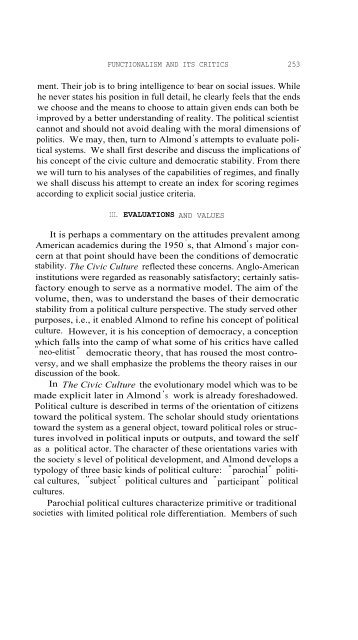FUNCTIONALISM AND ITS CRITICS - Intercollegiate Studies Institute
FUNCTIONALISM AND ITS CRITICS - Intercollegiate Studies Institute
FUNCTIONALISM AND ITS CRITICS - Intercollegiate Studies Institute
Create successful ePaper yourself
Turn your PDF publications into a flip-book with our unique Google optimized e-Paper software.
<strong>FUNCTIONALISM</strong> <strong>AND</strong> <strong>ITS</strong> <strong>CRITICS</strong> 253<br />
ment. Their job is to bring intelligence to , bear on social issues. While<br />
he never states his position in full detail, he clearly feels that the ends<br />
we choose and the means to choose to attain given ends can both be<br />
improved by a better understanding of reality. The political scientist<br />
cannot and should not avoid dealing with the moral dimensions of<br />
politics. We may, then, turn to Almond ' s attempts to evaluate political<br />
systems. We shall first describe and discuss the implications of<br />
his concept of the civic culture and democratic stability. From there<br />
we will turn to his analyses of the capabilities of regimes, and finally<br />
we shall discuss his attempt to create an index for scoring regimes<br />
according to explicit social justice criteria.<br />
III. EVALUATIONS <strong>AND</strong> VALUES<br />
It is perhaps a commentary on the attitudes prevalent among<br />
American academics during the 1950 ' s, that Almond ' s major concern<br />
at that point should have been the conditions of democratic<br />
stability. The Civic Culture reflected these concerns. Anglo-American<br />
institutions were regarded as reasonably satisfactory; certainly satisfactory<br />
enough to serve as a normative model. The aim of the<br />
volume, then, was to understand the bases of their democratic<br />
stability from a political culture perspective. The study served other<br />
purposes, i.e., it enabled Almond to refine his concept of political<br />
culture. However, it is his conception of democracy, a conception<br />
which falls into the camp of what some of his critics have called<br />
" neo-elitist " democratic theory, that has roused the most controversy,<br />
and we shall emphasize the problems the theory raises in our<br />
discussion of the book.<br />
In The Civic Culture the evolutionary model which was to be<br />
made explicit later in Almond ' s work is already foreshadowed.<br />
Political culture is described in terms of the orientation of citizens<br />
toward the political system. The scholar should study orientations<br />
toward the system as a general object, toward political roles or structures<br />
involved in political inputs or outputs, and toward the self<br />
as a political actor. The character of these orientations varies with<br />
the society ' s level of political development, and Almond develops a<br />
typology of three basic kinds of political culture: " parochial " political<br />
cultures, " subject " political cultures and " participant " political<br />
cultures.<br />
Parochial political cultures characterize primitive or traditional<br />
societies with limited political role differentiation. Members of such
















